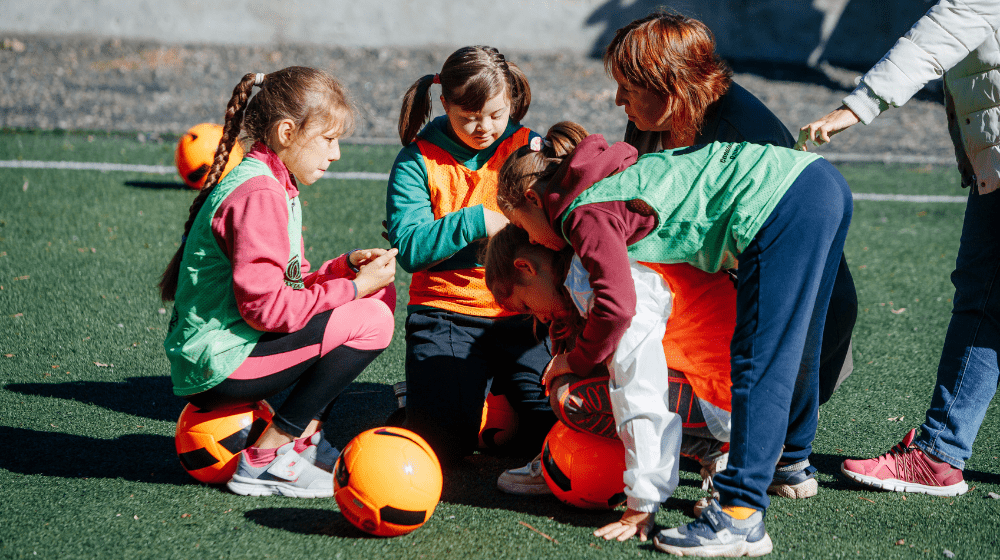— So, who's next? Mariyko, come out and show the exercises, the football coach Serhiy guides the girls.
— Everyone, do an exercise called “butterfly”. Hey, who will “fly” faster? Wave your “wings”, he asks them during the warm-up.
Before playing with a ball, each of the 12 girls repeats the exercises one by one. It may seem like a normal children's football training, yet every girl (on the team) has intellectual disabilities and needs special care in sports activities.
Together they are a special football team, which trains in Kyiv thanks to a joint project ‘Come On, Let’s Play!’ implemented in partnership with UNFPA, the United Nations Population Fund in Ukraine, Shakhtar Social Foundation and the Special Olympics of Ukraine. Besides the Ukrainian capital, such football classes take place regularly in Mariupol and Kharkiv since the fall of 2019 and starting from this year – also in Vinnytsia. About 80 girls with intellectual disabilities attend them.
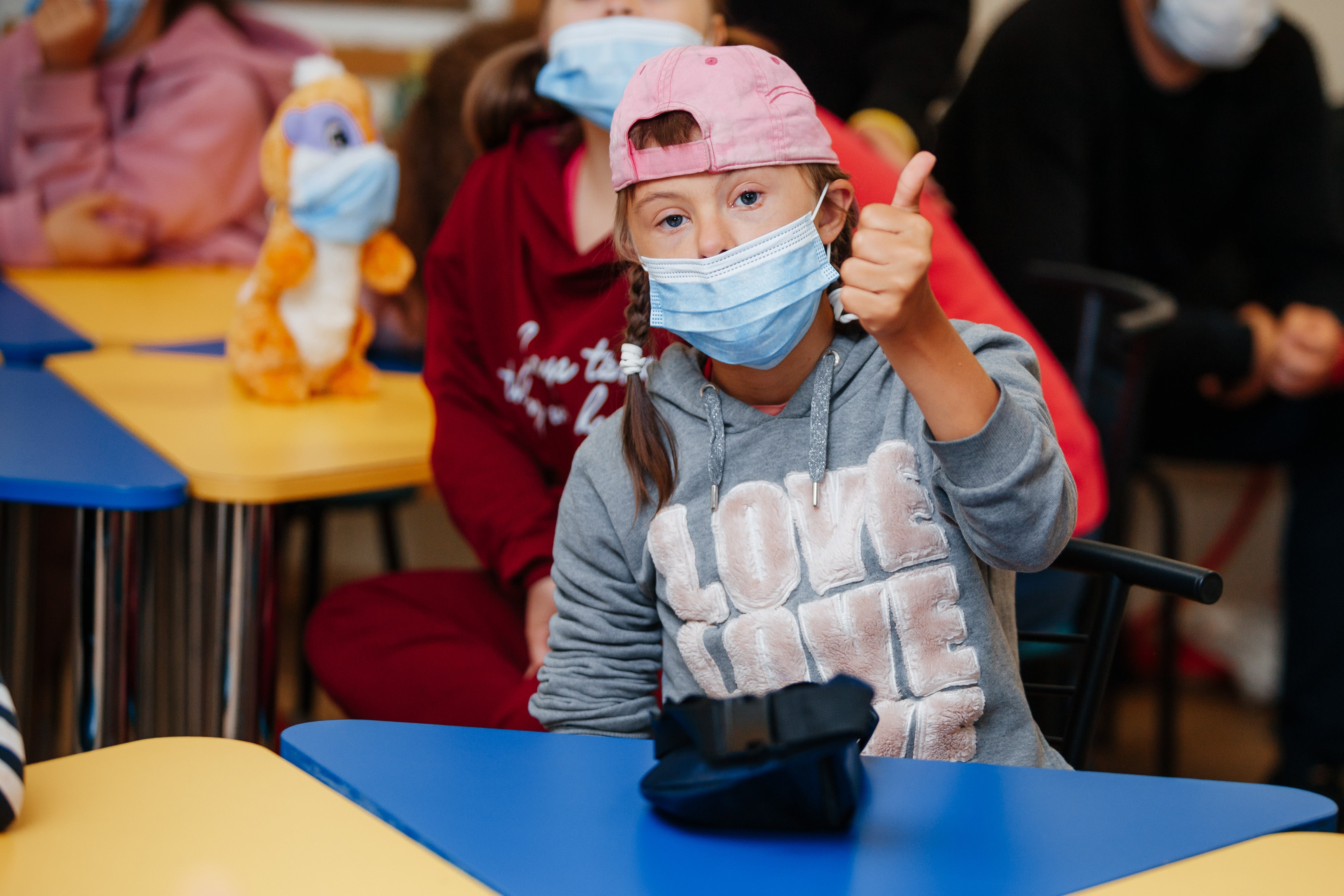
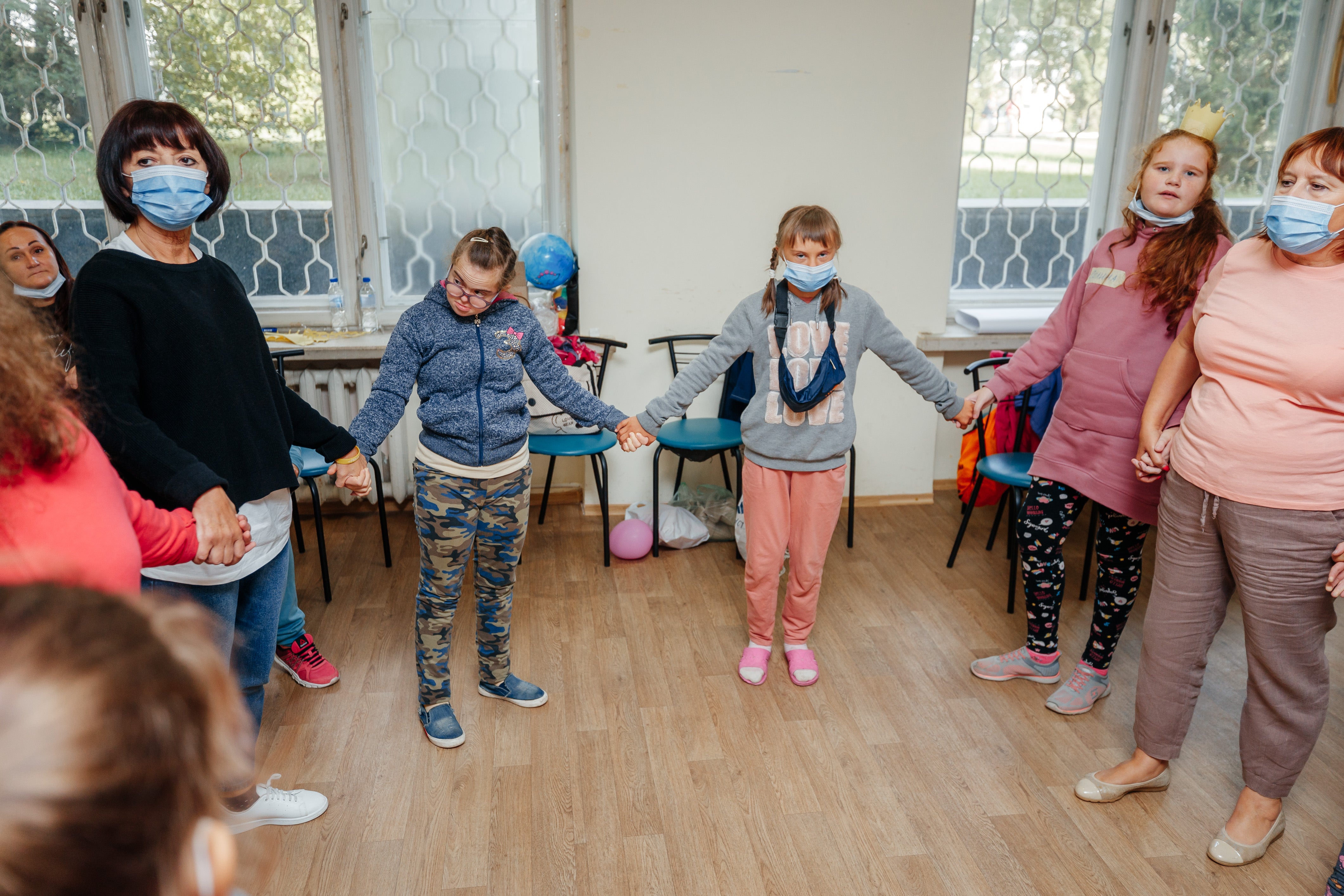
11-year-old Masha is one of the attendees. This young girl with Down’s syndrome studies in an inclusive class and has been playing football for two years. Masha's mother, Tetyana Yaremchuk believes that her daughter has potential for sports, so she tries to seize every opportunity for Masha’s development. However, the problem is that there is a lack of them in Ukraine.
`Earlier we attended classes as part of the state programme with a trainer-rehabilitation specialist, but the financing of the programme was stopped. Now we continue taking classes, but we pay for them because the coach is great and the results of working with him are very noticeable. I searched both athletics and tennis classes, but I can't find anything suitable for children with intellectual disabilities, so it's hard to talk about development in sports under such conditions’, Tetyana Yaremchuk says.
These lack of opportunities inspired the Shakhtar Social Foundation to organize football trainings for girls with intellectual disabilities.
`We sincerely believe that everyone can play football, regardless of gender or talent, – says Inna Khmyzova, Head of the Shakhtar Social Foundation. – All children are different, in particular there are children with disabilities, intellectual disabilities, who have absolutely no opportunity to regularly do sports, play football, neither at a cost nor for free. That's why we started teaching coaches and engaging different partners in the project. And we will keep going on, as such trainings are invaluable’.
Girls, aged 7 and older, study according to a special adaptive training programme developed in partnership with three organizations. Shakhtar's coaches receive training to better understand the specifics of work with children with disabilities. Sometimes it happens that a child does not know how to jump or has a problem with attention span, so the task of the coach is to find an (adapted) approach for each student.
‘During Masha’s first football training, she did not want to do anything. It seemed to me like a complete failure. However, coach Serhiy told me that such a situation was normal, and I just had to wait. And he was right. The way she exercises now is incomparable, like “chalk and cheese”, thanks to the coaches. One time Masha did not want to repeat the exercises after the coach, so he asked her to come out and show him what to do. And this approach worked. Now they start each training with warm-up exercises, where every girl demonstrates their exercises’, says Tetyana Yaremchuk, a mother of a Kyiv team member Maria.
Sport is not only about physical exercise
Besides improving physical skills, football training helps to improve cognitive abilities, discipline, and socialization skills. Both the experts and the parents of this girls team confirm this fact.
‘These pieces of training help children to develop self-care, and communication skills. I know many examples when trained athletes with intellectual disabilities won over peers without disabilities. Therefore, this project demonstrates that people with disabilities, especially those who are athletes, can have a positive impact on society, says Andriy Pidvarko, an Executive Director of the Special Olympics in Ukraine.
According to him, people with intellectual disabilities are the largest and most vulnerable social group.
‘Official data shows that people with intellectual disabilities constitute 65% of all other groups of disabilities. Despite they are a majority, little to no attention is paid to them. If a person with cerebral palsy can earn money online, people with intellectual disabilities need the help of others. Instead, they face prejudice. Very rarely they can be seen in theaters or on the streets. “We want and need to change that”, says Andriy Pidvarko.
To promote the socialization of children with intellectual disabilities, the Shakhtar Social Foundation organizes inclusive training once a month – where children without disabilities join the teams of girls with disabilities. Although Ukrainian society has not yet achieved full inclusiveness, the Foundation considers this experience quite a successful one.
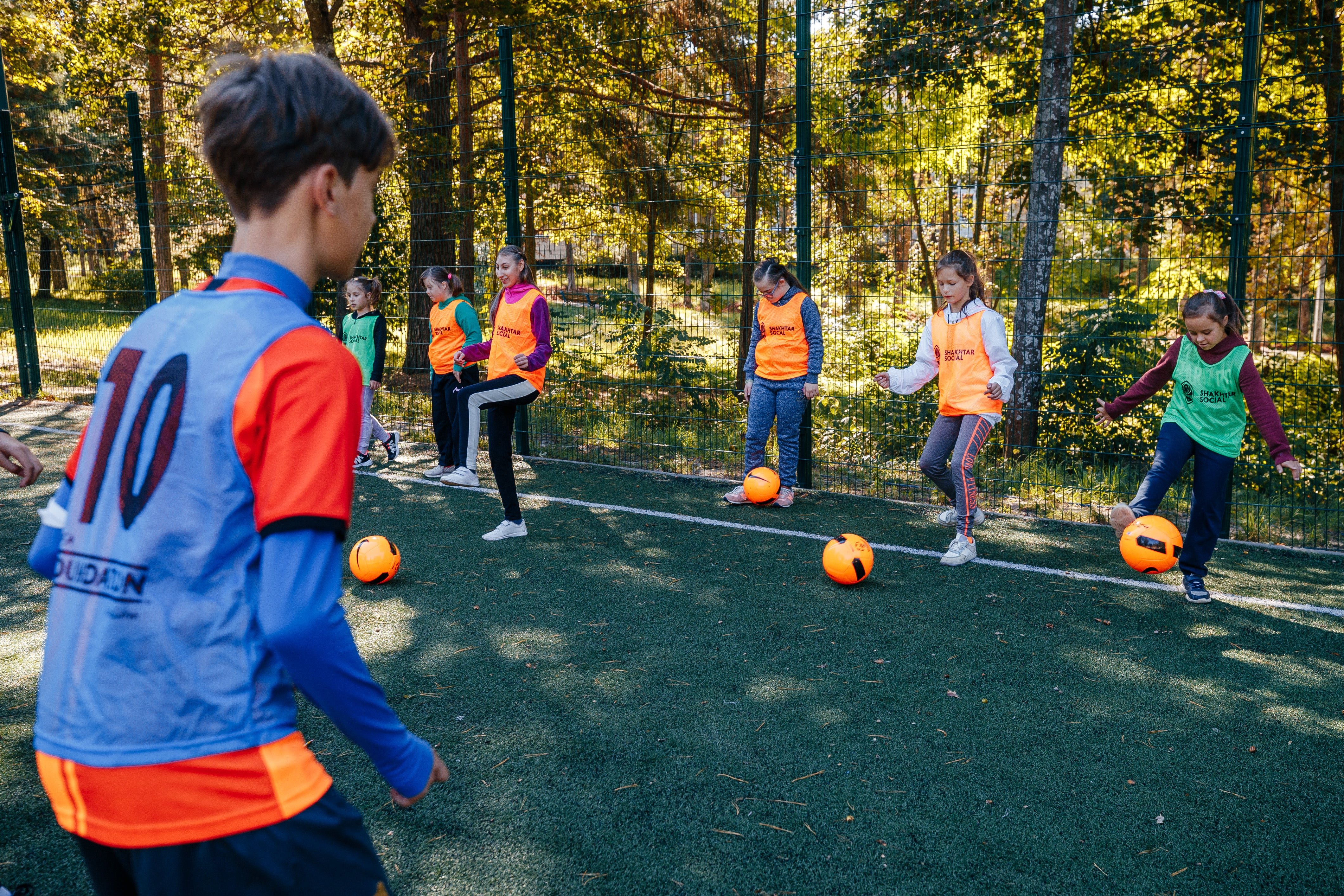
‘The topic of inclusiveness is complicated and requires systematic work. If children without disabilities realize from an early age that all people are different, there will be no negative reactions. Our experience demonstrates this well. Children under the age of 5 perceive children with different diagnoses more naturally and do not notice any differences. After all, as we become older we begin to think more stereotypical, it is more difficult to perceive something new, especially in adolescence. And it's not because the children are bad, they just haven't seen such children before’, says Inna Khmyzova.
Psychologists Olga Sklyarova and Yevhenia Kurchenko assure that such interaction benefits everyone. For children with disabilities, children without disabilities are an example of a behavior model and for children without disabilities such interaction is an opportunity to develop empathy and tolerance. Parents of girls with disabilities agree with this.
‘Our children are great copycats. Children without disabilities who attend inclusive classes are kinder than their peers. One day I witnessed a demonstrative situation when Masha's classmate, who is considered a bully, knelt to help her put on her shoes. Other days he could hit her, pull, but when she needed help, he provided it”, says Tetyana Yaremchuk.
Life skills
Football classes for girls with intellectual disabilities are regular and take place once a week. The COVID-19 pandemic has influenced the situation, significantly slowing down the pace of the project’s implementation. After all, the remote format of work is not suitable for children with intellectual disabilities.
To make up for the lost time, the United Nations Population Fund, in partnership with the Shakhtar Social Foundation and the Special Olympics of Ukraine, has decided to launch its informal education programme – ‘Life Skills: Come On, Let’s Play!’ within the project ‘Come On, Let’s Play!’ The programme was piloted at the camp ‘Artek’ in Pushcha-Vodytsya for the first time, where members of the Kyiv football team spent a week in the early autumn.
***
– Polina, will you swim?
– Yeah!
– What about kayaks?
– Great!
– Do you want to read?
– No! – 11-year-old Polina confidently speaks about her desires.
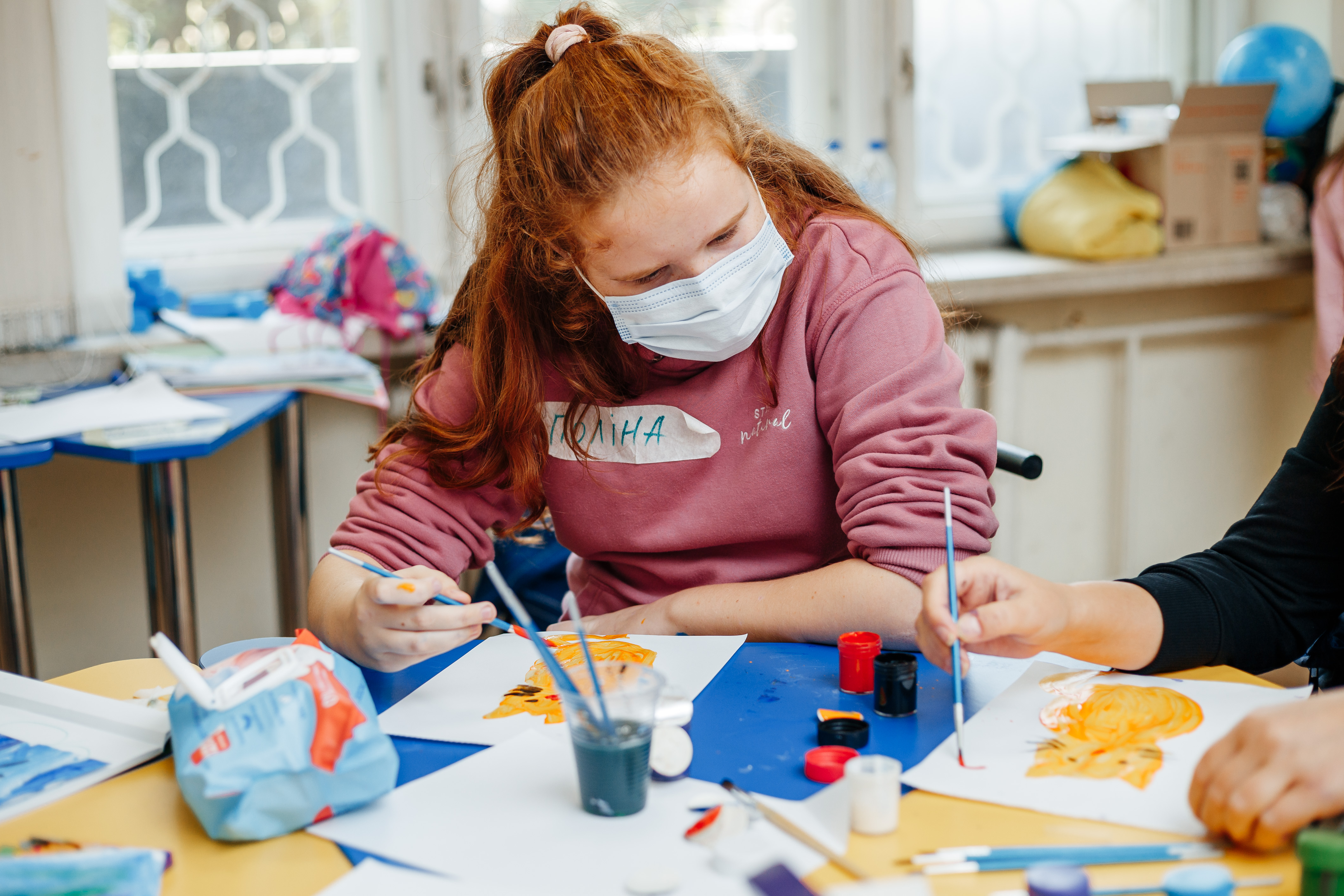
Polina, like all children of her age, likes to draw, play, swim, but sometimes is lazy when it comes to learning. Nevertheless, the girl is quite special – because of autism, she needs more attention from adults and patience from others. It can be difficult for her to deal with emotions, pronounce sounds, stay in a noisy environment and understand people around her. But the main difficulty is to communicate with them correctly.
But this does not prevent Polina from developing in different areas. The girl plays football, like Masha, and also paints, does pottery, and likes classical music. Polina's mother, Natalia Yakubovych, tries to satisfy all her daughter's interests and allows Polina to try herself in various fields. However, her main goal is to help her socialize as much as possible. That's why Polina has become one of the students of the UNFPA programme ‘Life Skills: Come On, Let’s Play!’
The programme consists of 12 interactive classes with games and exercises aimed at personal development and formation, as well as the development of communication skills appropriate for 9-12-year-old adolescents with intellectual disabilities, including Down syndrome.
The classes aim to develop attention, sensation, memory, thinking skills, as well as imagination, and also to improve their coordination and the ability to regulate emotions and behavior. In addition, during these classes, the girls learn to interact, negotiate, and behave properly in conflict situations.
According to psychologists Olga Sklyarova and Yevhenia Kurchenko, a week of active work with the group showed outstanding results.
‘If on the first-day parents could not leave their children, constantly controlled their behavior, on the third day they could comfortably attend to their own matters, while we were busy with the girls. And the girls have been changing every day. They have started to understand each other, to respond to requests, to interact. Most of them are non-verbal children. But they have begun to repeat the words and show themselves. The group therapy greatly contributed to this,’ says psychologist Yevhenia Kurchenko.
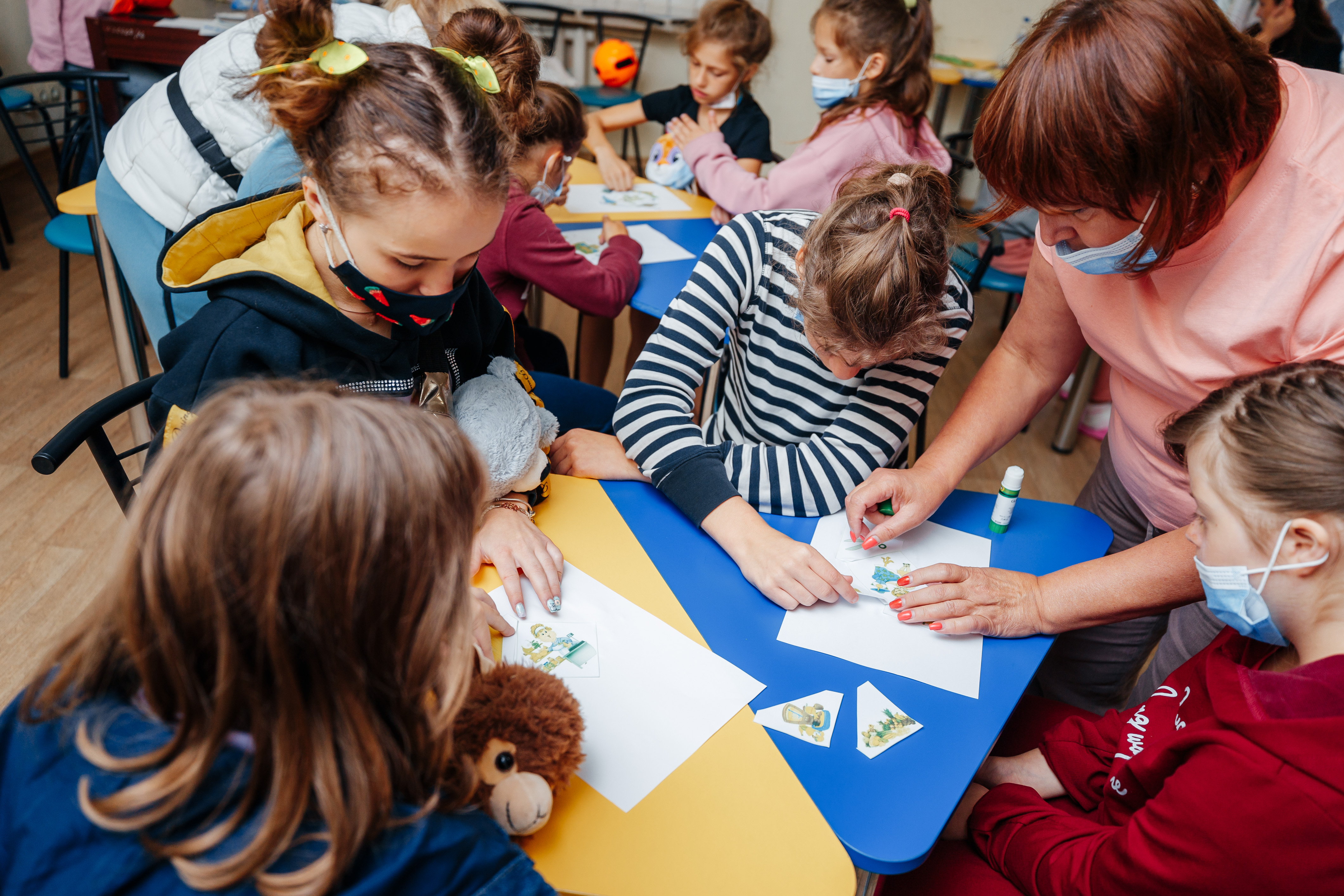
According to the psychologists, there are almost no opportunities to work with groups of children with disabilities in Ukraine, that’s why parents develop their children's skills amid individual therapy. But not everyone has the financial means to do so.
Besides training with psychologists, during the week in the camp, the girls swam in the pool, kayaked, took part in a master class at the media school, and passed the Special Olympics` examination of their bodies' condition and abilities. The theme of one lesson was about professions and ways to acquire them, because children with mental disabilities also need employment opportunities in the future.
‘This programme is a great example of how children with disabilities can succeed in a short period of active work if only they get such a chance. Like everyone else, they have talents and potential,’ says Lyudmyla Shevtsova, UNFPA Youth and HIV Programme Adviser in Ukraine.
UNFPA plans to obtain recommendations from the Ministry of Education so that the programme can be used by specialists from other institutions: inclusive resource centers, special boarding schools, and inclusive camps. In this way, many more children with intellectual disabilities will have the opportunity to improve their communication and socialization skills.
After all, everything that these parents want is acceptance and respect for their children.
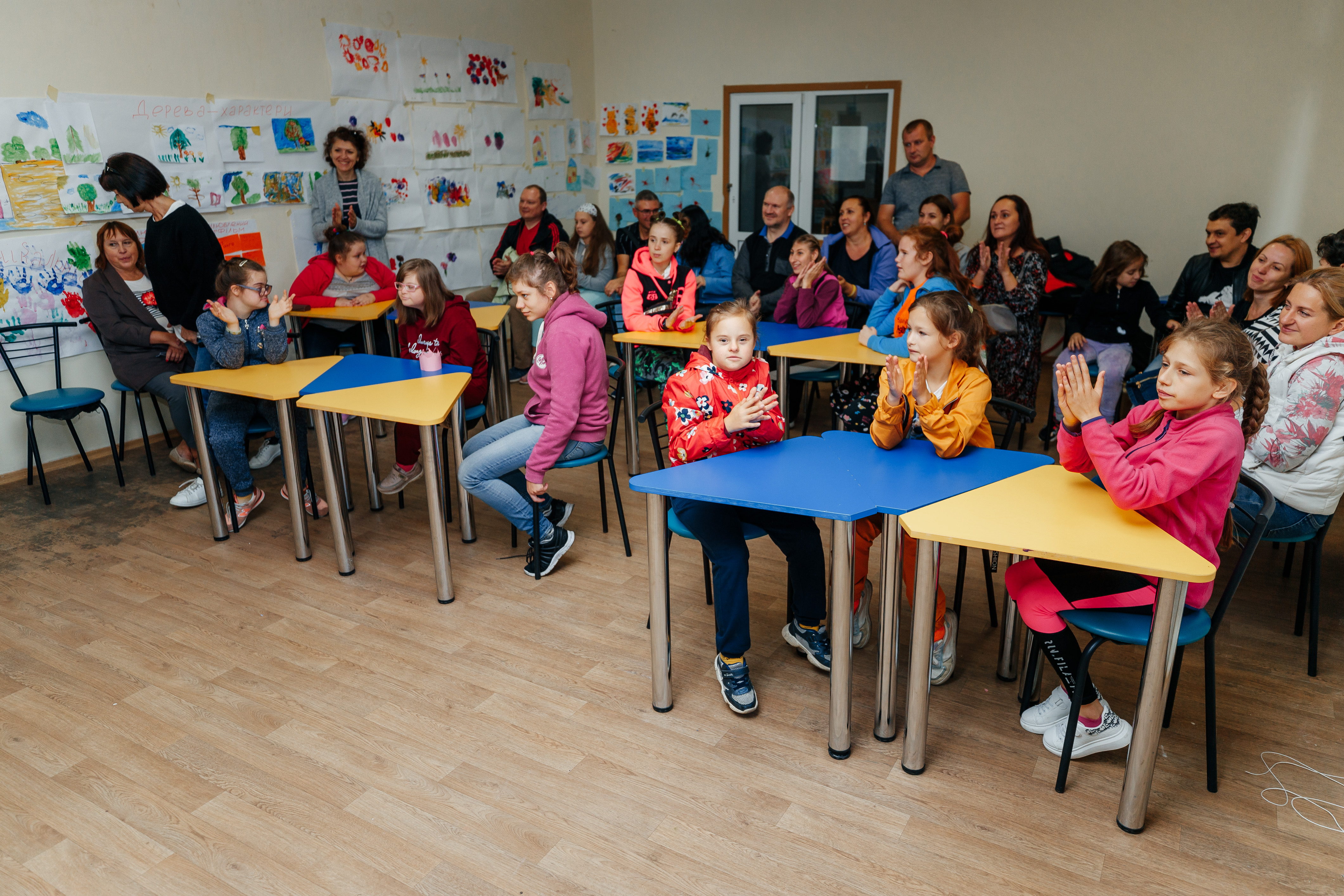
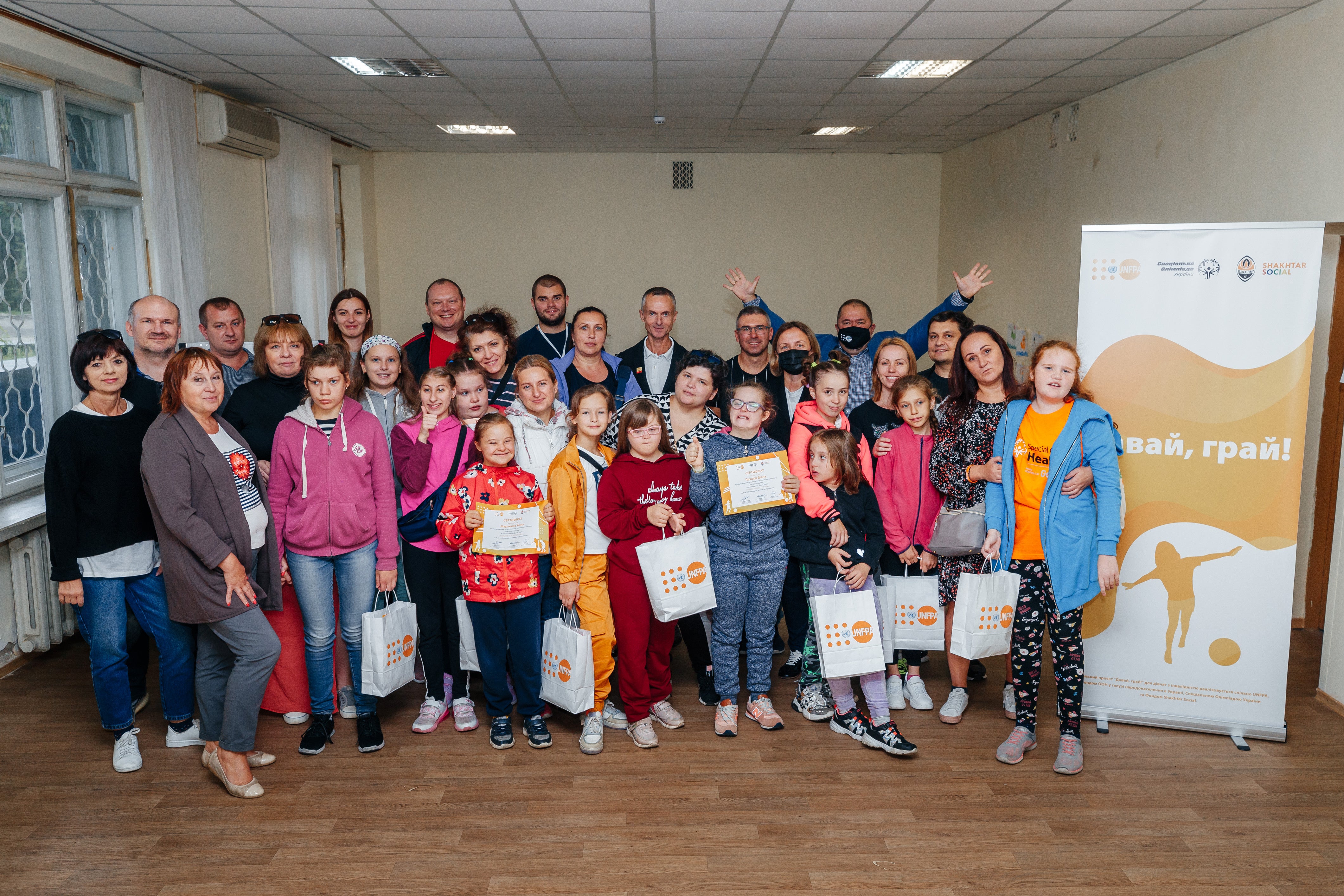
‘They are children, just children, personalities! We, the parents, do everything possible to make our children adapt to society. We do not change society for them, we change them according to the norms of society. They are the way they are - and it will not change', says Lidiya Matvisiv, the mother of Kyiv team member Dasha.
‘Perhaps, they came to this world to make it better?’, suggests Olena Marchenko, the mother of project participant Anya.
The project partners stand united in their beliefs and are ready to do everything to make children with intellectual disabilities full members of society, without any “but” or “if”.
The social project ‘Come on, Let’s Play!’ for girls with intellectual disabilities is implemented jointly by UNFPA, the United Nations Population Fund in Ukraine, the Special Olympics of Ukraine, and the Shakhtar Social Foundation.
Writing by Anastasiia Shepeleva

